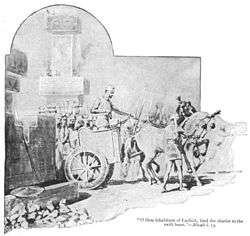Micah 3
Micah 3 is the third chapter of the Book of Micah in the Hebrew Bible or the Old Testament of the Christian Bible.[1][2] This book contains the prophecies attributed to the prophet Micah, and is a part of the Book of the Twelve Minor Prophets.[3][4]
| Micah 3 | |
|---|---|
 An illustration of Micah 1:13: "O thou inhabitant of Lachish, bind the chariot to the swift beast." (www.ordination.org). | |
| Book | Book of Micah |
| Category | Nevi'im |
| Christian Bible part | Old Testament |
| Order in the Christian part | 33 |
Text
The original text was written in the Hebrew language. This chapter is divided into 12 verses.
Textual versions
Some early manuscripts containing the text of this chapter in Hebrew are of the Masoretic Text tradition, which includes the Codex Cairensis (895), the Petersburg Codex of the Prophets (916), Codex Leningradensis (1008).[5][lower-alpha 1]
Fragments cumulatively containing all verses of this chapter were found among the Dead Sea Scrolls, including 4Q82 (4QXIIg; 25 BCE) with extant verses 12;[7][8][9] and Wadi Murabba'at Minor Prophets (Mur88; MurXIIProph; 75-100 CE) with extant verses 1‑12.[8][10]
There is also a translation into Koine Greek known as the Septuagint, made in the last few centuries BCE. Extant ancient manuscripts of the Septuagint version include Codex Vaticanus (B; B; 4th century), Codex Alexandrinus (A; A; 5th century) and Codex Marchalianus (Q; Q; 6th century).[11][lower-alpha 2] Some fragments containing parts of this chapter in Greek were found among the Dead Sea Scrolls, that is, Naḥal Ḥever 8Ḥev1 (8ḤevXIIgr; late 1st century BCE) with extant verses 5-6.[8][13]
Verse 2
- Who hate the good,
- and love the evil;
- 'who pluck off their skin from off them,
- and their flesh from off their bones;[14]
- "'Who hate the good, and love the evil": Man, at first, loves and admires the good, even while he cloth it not; he hates the evil, even while he does it, or as soon as he has done it. But man cannot bear to be at strife with his conscience, and so he ends it, by excusing himself and telling lies to himself. And then, he hates the truth or good with a bitter hatred, because it disturbs the darkness of the false peace with which he would envelop himself. At first, men love only the pleasure connected with the evil; then they make whom they can, evil, because goodness is a reproach to them: in the end, they love evil for its own sake Romans 1:32. pagan morality too distinguished between the incontinent and the unprincipled, the man who sinned under force of temptation, and the man who had lost the sense of right and wrong John 3:20. "Everyone that doeth evil, hateth the light. Whoso longeth for things unlawful, hateth the righteousness which rebuketh and punisheth" .[15]
- "Who pluck off their skin from off them": They are not shepherds, but butchers. We have the same figurative expression for merciless extortion and pillage. Ezekiel makes a similar complaint (Ezekiel 34:2-4).[16]
- "Pluck off their skin from off them, and their flesh from off their bones": Rob their fellow countrymen of all their substance (Psalm 14:4; Proverbs 30:14).[17] So the Targum, "seizing on their substance by violence, and their precious mammon they take away."[18]
Verse 12
- Therefore because of you
- Zion shall be plowed like a field,
- Jerusalem shall become heaps of ruins,
- And the mountain of the temple
- Like the bare hills of the forest. (NKJV)[19]
Cited in Jeremiah 26:18
- "Temple": literally "house".[20]
In the Masoretic Text there is a note in margin of this verse indicating it as the middle of the "book" (i.e., the Book of the Twelve Prophets).[21]
See also
- Related Bible parts: Psalm 14, Proverbs 30, Jeremiah 20, Jeremiah 26, Ezekiel 34, Ephesians 3
Notes
- Since 1947 the current text of Aleppo Codex is missing Micah 1:1 to 5:1.[6]
- Book of Micah is missing in the extant Codex Sinaiticus.[12]
References
- Collins 2014.
- Hayes 2015.
- Metzger, Bruce M., et al. The Oxford Companion to the Bible. New York: Oxford University Press, 1993.
- Keck, Leander E. 1996. The New Interpreter's Bible: Volume: VII. Nashville: Abingdon.
- Würthwein 1995, pp. 35-37.
- P. W. Skehan (2003), "BIBLE (TEXTS)", New Catholic Encyclopedia, 2 (2nd ed.), Gale, pp. 355–362
- Ulrich 2010, p. 615.
- Dead sea scrolls - Micah
- Fitzmyer 2008, p. 39.
- Fitzmyer 2008, pp. 140-141.
- Würthwein 1995, pp. 73-74.
- Shepherd 2018, p. 13.
- Fitzmyer 2008, p. 127.
- Micah 3:2
- Barnes, Albert. Notes on the Old Testament. London, Blackie & Son, 1884. Reprint, Grand Rapids: Baker Books, 1998.

- Joseph S. Exell; Henry Donald Maurice Spence-Jones (Editors). The Pulpit Commentary. 23 volumes. First publication: 1890.

- Robert Jamieson, Andrew Robert Fausset; David Brown. Jamieson, Fausset, and Brown's Commentary On the Whole Bible. 1871.

- John Gill. John Gill's Exposition of the Entire Bible. Exposition of the Old and New Testament. Published in 1746-1763.

- Micah 3:2
- Notes in New King James Version on Micah 3:12
- Shepherd 2018, p. 23.
Sources
- Collins, John J. (2014). Introduction to the Hebrew Scriptures. Fortress Press. ISBN 9781451469233.CS1 maint: ref=harv (link)
- Fitzmyer, Joseph A. (2008). A Guide to the Dead Sea Scrolls and Related Literature. Grand Rapids, MI: William B. Eerdmans Publishing Company. ISBN 9780802862419.CS1 maint: ref=harv (link)
- Hayes, Christine (2015). Introduction to the Bible. Yale University Press. ISBN 0300188277.CS1 maint: ref=harv (link)
- Shepherd, Michael (2018). A Commentary on the Book of the Twelve: The Minor Prophets. Kregel Exegetical Library. Kregel Academic. ISBN 978-0825444593.
- Ulrich, Eugene, ed. (2010). The Biblical Qumran Scrolls: Transcriptions and Textual Variants. Brill.CS1 maint: ref=harv (link)
- Würthwein, Ernst (1995). The Text of the Old Testament. Translated by Rhodes, Erroll F. Grand Rapids, MI: Wm. B. Eerdmans. ISBN 0-8028-0788-7. Retrieved January 26, 2019.